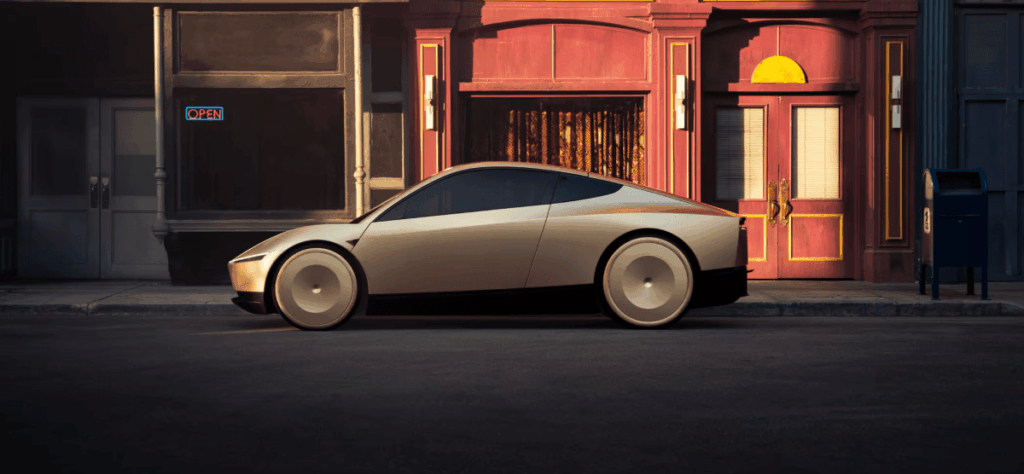
<strong>Image Credits:</strong>Tesla
Tesla Robotaxi Trademark Rejected: USPTO Calls Name “Too Generic” Ahead of June Launch
Tesla’s Cybercab autonomous vehicle faces trademark hurdles as the company prepares for its June launch event. Image Credits: Tesla
Table of Contents
Tesla’s ambitious plans for its autonomous vehicle lineup have hit a significant roadblock as the U.S. Patent and Trademark Office (USPTO) refused the company’s application to trademark the term “Robotaxi” for its vehicles. According to a recent filing, trademark officials deemed the name “too generic” for exclusive use. Simultaneously, Tesla’s applications for the “Cybercab” trademark have been halted due to conflicting claims from other companies with “Cyber” trademarks, creating potential complications for the planned June launch of these autonomous vehicles.
USPTO Rejects ‘Robotaxi’ Trademark as “Too Generic”
On Tuesday, the USPTO issued what’s called a “nonfinal office action” on Tesla’s “Robotaxi” trademark application. The patent office refused the application on grounds that the term is “merely descriptive” and appears to be “generic in the context of applicant’s goods and/or services.” This decision gives Tesla three months to file a response before the application is abandoned entirely.
The Tesla Robotaxi trademark application was submitted in October 2024, on the same day the company revealed its Cybercab, the purpose-built electric vehicle intended for its autonomous ride-hailing service. In its application, Tesla specified it would use the term “Robotaxi” in reference to “land vehicles; electric vehicles, namely automobiles; automobiles; and structural parts therefor.”
USPTO’s Reasoning for Rejection
While examining Tesla’s application, the USPTO found no conflicting trademarks already in existence. However, they rejected the application because “Robotaxi” is already “used to describe similar goods and services by other companies” in the autonomous vehicle industry, making it too generic for one company to claim exclusive rights.
Cybercab Trademark Complications
Tesla’s naming troubles extend beyond the Robotaxi trademark rejection. Applications for trademarking the term “Cybercab” have also been halted due to other companies pursuing similar “Cyber” trademarks. This includes at least one company that has applied for numerous trademarks related to aftermarket Cybertruck accessories.
The conflict over “Cyber” prefixed names creates an additional challenge for Tesla as it prepares to launch its autonomous vehicle service. The Cybercab is a critical component of Tesla’s autonomous strategy, designed as a purpose-built electric vehicle specifically for autonomous operation. Without trademark protection, Tesla could face limitations in how it markets and distinguishes these vehicles.
| Trademark Application | Status | Issue |
|---|---|---|
| Robotaxi (for vehicles) | Rejected | Deemed “merely descriptive” and “generic” |
| Robotaxi (for ride-hailing service) | Under examination | No decision filed yet |
| Cybercab | Halted | Conflicts with other “Cyber” trademarks |
| Robobus | Under examination | No decision filed yet |
Tesla’s Required Response and Next Steps
Tesla now has three months to respond to the USPTO’s rejection of its Robotaxi trademark. The company will need to provide substantial evidence and arguments to support its claim to the name. Specifically, the USPTO is asking Tesla to submit “fact sheets, instruction manuals, brochures, advertisements and pertinent screenshots of applicant’s website” relating to the goods and services in the application.
Additionally, Tesla must inform the USPTO if “competitors” use the terms “ROBO, ROBOT, or ROBOTIC to advertise similar goods and/or services.” This requirement underscores the challenge Tesla faces in claiming exclusive rights to terminology that may be considered standard descriptive language in the autonomous vehicle industry.
Tesla’s Options for Response
To overcome the Robotaxi trademark rejection, Tesla has several potential strategies:
- Provide evidence that the term has acquired distinctiveness through Tesla’s marketing
- Demonstrate that consumers specifically associate “Robotaxi” with Tesla’s products
- Modify the trademark application to be more specific or distinctive
- Consider alternative naming strategies for their autonomous vehicle fleet
Ride-Sharing Service Trademark Still Under Review
While the vehicle-related Robotaxi trademark application has been rejected, Tesla has another application pending that would cover use of the word for transportation services. This application would protect the term when offering “coordinating travel arrangements for individuals and for groups,” “arranging time-based ridesharing services,” and vehicle sharing or rentals.
This secondary application was assigned to a USPTO examiner on April 14, the same day as the vehicle-related application, but no decision has been filed yet. The outcome of this application could be crucial for Tesla’s plans to launch an autonomous ride-hailing service, even if the vehicle-specific trademark is ultimately denied.
Tesla’s Pending Trademarks
Beyond the Robotaxi and Cybercab applications, Tesla submitted two similar trademark applications on October 10, 2024, for the term “Robobus.” These applications are also still under examination by the USPTO and could face similar challenges if deemed too descriptive of autonomous bus services.
Implications for June Launch Plans
The Tesla Robotaxi trademark rejection and Cybercab naming complications come at a critical time as the company prepares for its anticipated June launch event. These trademark issues could potentially impact Tesla’s marketing strategy, forcing the company to reconsider how it positions and brands its autonomous vehicle offerings.
While trademark protections are important for brand building and intellectual property security, the rejections don’t necessarily prevent Tesla from using these terms entirely. However, without trademark protection, competitors could potentially use similar terminology, potentially diluting Tesla’s brand identity in the autonomous vehicle space.
As of publication, a trademark lawyer representing Tesla had not responded to requests for comment on the rejections or the company’s plans to address these naming challenges. With the June launch approaching rapidly, Tesla will need to quickly determine its strategy for addressing these trademark hurdles while maintaining momentum for its autonomous vehicle program.





